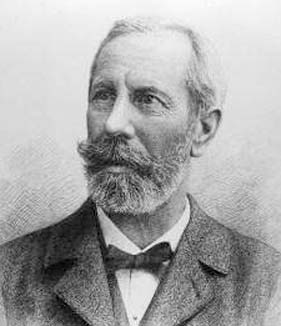Otto Stolz (nonfiction): Difference between revisions
(Created page with "[[]]'''Otto Stolz''' (3 July 1842 – 23 November 1905) was an Austrian mathematician noted for his work on mathematical analysis and infinitesimals. Born in Hall in Tirol, he...") |
No edit summary |
||
| (One intermediate revision by the same user not shown) | |||
| Line 1: | Line 1: | ||
[[]]'''Otto Stolz''' (3 July 1842 – 23 November 1905) was an Austrian | [[File:Otto_Stolz.jpg|thumb|Otto Stolz.]]'''Otto Stolz''' (3 July 1842 – 23 November 1905) was an Austrian [[Mathematician (nonfiction)|mathematician]] noted for his work on [[Mathematical analysis (nonfiction)|mathematical analysis]] and infinitesimals. | ||
His work began with geometry (on which he wrote his thesis) but after the influence of Weierstrass it shifted to real analysis, and many small useful theorems are credited to him. | Born in Hall in Tirol, he studied in Innsbruck from 1860 and in Vienna from 1863, receiving his habilitation there in 1867. Two years later he studied in Berlin under [[Karl Weierstrass (nonfiction)|Karl Weierstrass]], [[Ernst Kummer (nonfiction)|Ernst Kummer]] and [[Leopold Kronecker (nonfiction)|Leopold Kronecker]], and in 1871 heard lectures in Göttingen by [[Alfred Clebsch (nonfiction)|Alfred Clebsch]] and [[Felix Klein (nonfiction)|Felix Klein]] (with whom he would later correspond), before returning to Innsbruck permanently as a professor of mathematics. | ||
His work began with [[Geometry (nonfiction)|geometry]] (on which he wrote his thesis) but after the influence of [[Karl Weierstrass (nonfiction)|Weierstrass]] it shifted to real analysis, and many small useful theorems are credited to him. | |||
He died in 1905 shortly after finishing work on ''Einleitung'' in ''die Funktionentheorie''. His name lives on in the Stolz-Cesàro theorem. | He died in 1905 shortly after finishing work on ''Einleitung'' in ''die Funktionentheorie''. His name lives on in the Stolz-Cesàro theorem. | ||
| Line 25: | Line 27: | ||
* [[Calculus (nonfiction)]] | * [[Calculus (nonfiction)]] | ||
* [[Georg Cantor (nonfiction)]] | |||
* [[Alfred Clebsch (nonfiction)]] | |||
* [[Leopold Kronecker (nonfiction)]] | |||
* [[Ernst Kummer (nonfiction)]] | |||
* [[Mathematical analysis (nonfiction)]] | |||
* [[Mathematics (nonfiction)]] | * [[Mathematics (nonfiction)]] | ||
* [[Blaise Pascal (nonfiction)]] | * [[Blaise Pascal (nonfiction)]] | ||
* [[Karl Weierstrass (nonfiction)]] | |||
External links: | External links: | ||
Latest revision as of 14:04, 22 January 2018
Otto Stolz (3 July 1842 – 23 November 1905) was an Austrian mathematician noted for his work on mathematical analysis and infinitesimals.
Born in Hall in Tirol, he studied in Innsbruck from 1860 and in Vienna from 1863, receiving his habilitation there in 1867. Two years later he studied in Berlin under Karl Weierstrass, Ernst Kummer and Leopold Kronecker, and in 1871 heard lectures in Göttingen by Alfred Clebsch and Felix Klein (with whom he would later correspond), before returning to Innsbruck permanently as a professor of mathematics.
His work began with geometry (on which he wrote his thesis) but after the influence of Weierstrass it shifted to real analysis, and many small useful theorems are credited to him.
He died in 1905 shortly after finishing work on Einleitung in die Funktionentheorie. His name lives on in the Stolz-Cesàro theorem.
Stolz published a number of papers containing constructions of non-Archimedean extensions of the real numbers, as detailed by Ehrlich (2006). His work, as well as that of Paul du Bois-Reymond, was sharply criticized by Georg Cantor as an "abomination". Cantor published a "proof-sketch" of the inconsistency of infinitesimals. The errors in Cantor's proof are analyzed by Ehrlich (2006).
Bibliography:
- Philip Ehrlich (2006) "The rise of non-Archimedean mathematics and the roots of a misconception. I. The emergence of non-Archimedean systems of magnitudes", Archive for History of Exact Sciences 60, no. 1, 1–121.
In the News
Fiction cross-reference
Nonfiction cross-reference
- Calculus (nonfiction)
- Georg Cantor (nonfiction)
- Alfred Clebsch (nonfiction)
- Leopold Kronecker (nonfiction)
- Ernst Kummer (nonfiction)
- Mathematical analysis (nonfiction)
- Mathematics (nonfiction)
- Blaise Pascal (nonfiction)
- Karl Weierstrass (nonfiction)
External links:
- Pierre de Fermat @ Wikipedia
